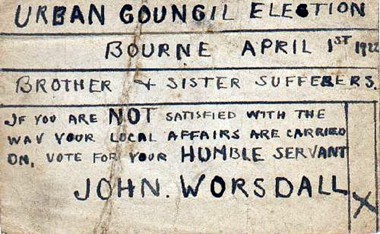Old John’s simple approach won him a
council
seat at the age of 80

by REX NEEDLE
|
Election candidates have been out and about in Bourne in recent weeks trying to drum up the votes needed to put them into office but none will have had the common touch favoured by John Worsdall in the early years of the last century. He was a retired farmer with little formal education but motivated by an innate common sense which earned him a reputation as Father of Bourne Urban District Council after winning a remarkable victory in the 1922 elections at the age of 80. John was born in 1842 and had his initial experience of local government when he served on the first Bourne Parish Council that existed for only five years from 1894 until 1899 when, because of the size and population of the area covered, the town was granted urban status and Bourne Urban District Council was formed. He was best known as a member of the Board of Guardians which administered the workhouse where he was particularly active in improving conditions for inmates, campaigning to get the men over 60 a weekly ounce of tobacco and in providing married couples over 65 double bedrooms with modern facilities to ensure that they could continue living together, whereas previously they had been separated. John was also acutely aware of their constant need for food and frequently caught rabbits while out working on the land to eke out their meagre diet. He had given up public life when he was 70 but in the spring of 1922, friends persuaded him to stand for election although there were many who did not take his candidature seriously. In the event, there were thirteen nominations for the five available vacancies and Old John, the respectful name he had by then acquired, polled 499 votes as an independent candidate when the population was just 4,310 to win a seat on the council. An unusual and perhaps even decisive feature of his campaign was the manifesto. The printing of election literature in those days was expensive and so he had the bright idea of producing his own. He bought a book of plain postcards and then laboriously wrote them out in ink one by one accompanied by his election address. a short poem he had composed himself, then handed the completed cards out to friends asking them to pass them on and in this way he managed to reach most voters in the town. One of these documents survives and is reproduced here as a record of what must be the strangest election campaign in the history of Bourne. The poem itself outlined his work in making life better for the inmates of the workhouse and his promise to fulfil his duties as a councillor, ending with the verse:
“On Saturday next at twelve o'clock His appeal struck a chord with the electorate and a local newspaper reporting the election results said that it had caused more excitement than any previous contest. Councillor Arthur Wall topped the poll and retained his seat for the fourth successive election while another councillor, Frederick Clarke, was similarly successful. But John Worsdall surprised everyone by polling sufficient votes to come third and the result was a popular one. "He is in the region of an octogenarian", commented a local newspaper, "and in many quarters was regarded as a dark horse. But even his most optimistic supporters never dreamt of his big score. Several prominent local questions no doubt had an influence on the election and when his name was announced, there was some boisterous cheering." His success caused a sensation in the town because three old and seemingly valued members were defeated in the process but after taking his seat, John soon earned an enviable reputation as Father of the Council, a veteran who, offend or please, always spoke his mind, whether relevant or irreverent, and the council chamber was a richer place for his presence. He abhorred convention, red tape was anathema, and at the very first meeting he attended after the election, he startled everyone by asking if there would be any objections to future meetings being held on licensed premises, one of his little jokes that did not go down well with the more staid members of the authority. At a later meeting, when councillors were discussing seating arrangements and procedures for committee and monthly meetings, John admonished them for wasting time. “Don’t make too many regulations or else an old man like me will be breaking them every minute”, he said. But his familiarity with the locality was invaluable to the council and he was appointed to serve on all of the main committees with special responsibilities for fen drainage, a subject of which he had first-hand experience, while he also enjoyed a reputation as a walking encyclopaedia on account of his knowledge of local drains and highways acquired during an earlier spell as the Surveyor of Highways. John died the year after his election to the council and the passing of this well-known and much loved townsman at the age of 81 was marked by the tolling of the tenor bell of the Abbey Church at noon on Sunday 26th August 1923. Few people who lived in the locality did not know of him or of his wise counsel, sound advice and loyal friendship and his death was grieved not only by his fellow council members but also by the people and hundreds turned up at his funeral at the Abbey Church. He had been married twice but was buried in the town cemetery next to his first wife, Sarah, who had died in Kesteven Asylum, Grantham, in 1900 aged 61. His second wife, Elizabeth, who survived him, was buried with him when she died in September 1944 at the age of 94. Neither grave has a memorial stone. |